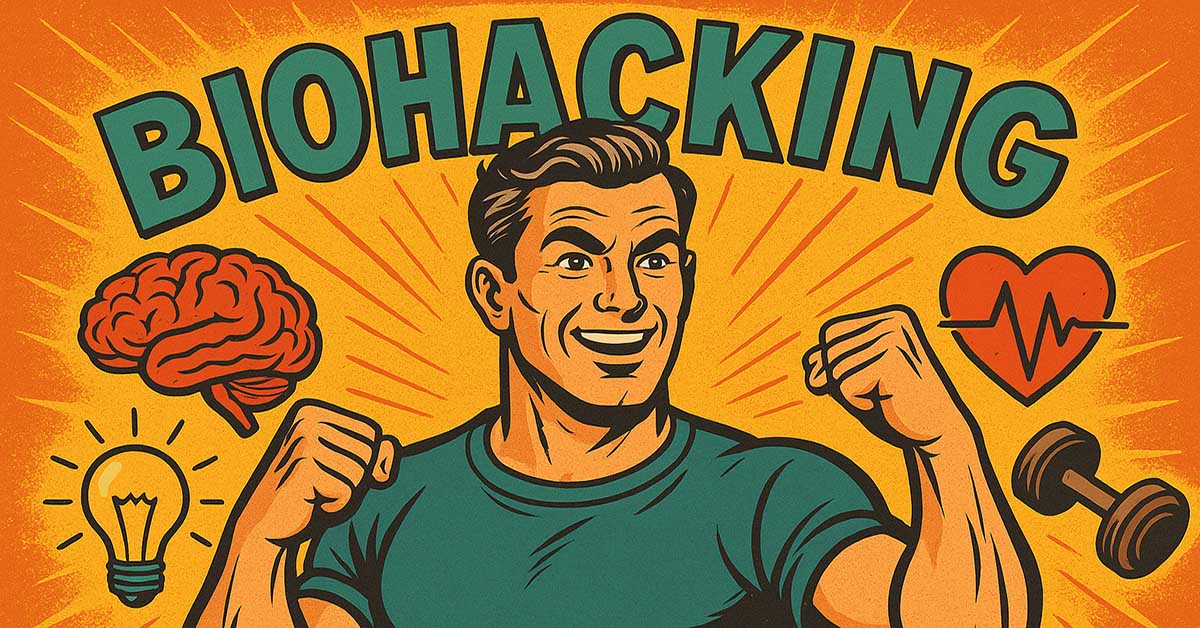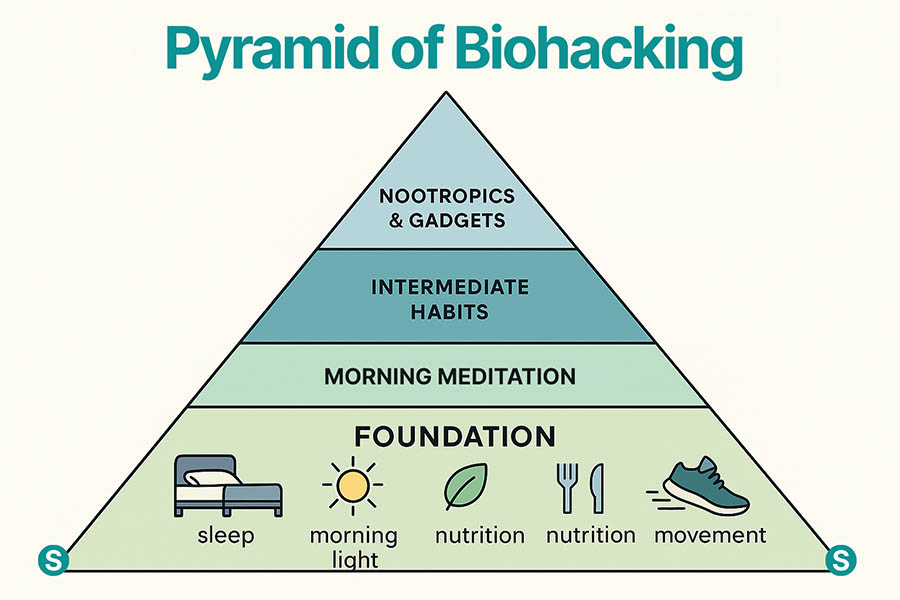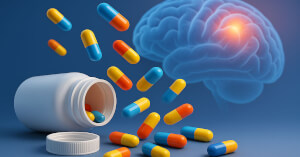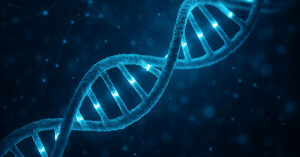
What Is Biohacking? How to Upgrade Your Body and Mind

What if tweaking small things in your daily routine could make you sharper at work, calmer in stressful moments, and even more energized when you hit the gym? That’s what biohacking is about.
It’s not magic or science fiction, it’s the practice of making intentional, measurable changes to how you eat, sleep, move, and sometimes supplement, to push your body and brain closer to their full potential.
Some people call it DIY biology, others see it as lifestyle engineering. Either way, it’s about experimenting with your own habits in smart, safe ways.
Now, there are extremes out there, implanting chips under the skin, injecting weird peptides, but let’s be real: most people just want to feel better, think clearer, and age a little slower.
In this guide, we’ll break down the basics of biohacking, what’s safe to try right away, and which advanced tools (like nootropic supplements) you might explore once you’ve got the basics down.
So, What Exactly Is Biohacking?
In plain English, biohacking is the art of tweaking your biology. Instead of passively accepting how you feel, you test small interventions, like adjusting your sleep schedule, fasting windows, or supplement routine, to see if you can get better outcomes.
Think of it like running personal experiments, except you’re the lab, the researcher, and the subject rolled into one.
It’s not brand-new. Ancient traditions like Ayurveda or Stoicism were forms of biohacking in their own way. But the term picked up steam in Silicon Valley, where engineers began applying the “optimize everything” mindset to their bodies. Today, it’s a broad spectrum: from adjusting your diet to wearing continuous glucose monitors, biohacking spans from common sense to cutting edge.
Is Biohacking Safe?
The short answer to this question: it depends. There are “light” hacks, like morning sunlight exposure or swapping late-night scrolling for reading, that are safe for anyone. And then there are “hardcore” hacks, like self-injecting stem cells, which aren’t something you should copy from Reddit threads.
The golden rule: start simple, listen to your body, and never treat biohacking as a replacement for real medical advice. Think of it as a complement, not a substitute.

Beginner Hacks You Can Try Today
1. Get Morning Sunlight
Step outside for 10–15 minutes after waking. Sunlight sets your circadian rhythm, which means better sleep at night and more stable energy in the day. No fancy gadget required, just the sky above you.
2. Cold Showers (or at least a cold finish)
End your shower with 30–60 seconds of cold water. It sounds brutal, but it trains your nervous system, boosts circulation, and gives you an instant mental “reset.”
3. Gentle Intermittent Fasting
Forget the extreme 18-hour fasts. Beginners can try a simple 12/12 schedule: 12 hours of eating, 12 hours of rest. It helps stabilize blood sugar and may improve energy flow.
4. Blue Light Control at Night
Ever notice how Netflix at midnight leaves you wired? That’s blue light. Use screen filters or simply dim your devices after 9 PM. Your melatonin will thank you.
5. Food as Nootropics
Not ready for pills? Start with natural brain foods: coffee + L-theanine from green tea for calm focus, blueberries for memory, walnuts for healthy fats. It’s biohacking straight from the kitchen.
6. Movement Snacks
Sit at a desk all day? Do 10 squats every hour or stretch for 30 seconds. Tiny bursts of movement wake up your muscles and surprisingly, your brain too.
7. Track Your Sleep
You don’t need an Oura Ring right away. A basic sleep journal, or your phone’s free sleep app, can highlight patterns. Awareness itself is a hack.
Advanced Biohacks: Exploring the Power of Nootropic Supplements
Once you’ve nailed the basics, you might feel curious about nootropics, substances that claim to sharpen focus, memory, or mood. Think of them as “brain gear” you can experiment with. But here’s the thing: they’re not shortcuts to genius. They’re more like subtle upgrades, and they work best on top of solid foundations like sleep and nutrition.
L-Theanine + Caffeine
This combo is the darling of the biohacking crowd. Caffeine wakes you up, but it can also make you jittery. Enter L-theanine, an amino acid from green tea that smooths the ride. Together, they give you calm alertness.
✔️ How to use it: Pair your morning coffee (80–100 mg caffeine) with 100–200 mg of L-theanine. Or simply drink matcha, which naturally contains both.
Rhodiola Rosea
An adaptogen from the Arctic regions, Rhodiola helps the body adapt to stress by balancing cortisol and supporting energy metabolism. Research suggests it may reduce fatigue, sharpen mental clarity, and improve resilience during demanding periods. Many biohackers rely on it to stay focused and steady through long workdays or high-pressure situations.
✔️ How to use it: 200–400 mg standardized extract (3% rosavins, 1% salidrosides), usually taken in the morning to avoid interfering with sleep.
Bacopa Monnieri
This traditional Ayurvedic herb often linked to learning and memory. Studies suggest Bacopa may enhance the speed of information processing, improve recall, and reduce anxiety that gets in the way of focus. The catch? It’s not a quick fix: you need several weeks of consistent use before noticing benefits, and its effects tend to build gradually over time.
✔️ How to use it: 300–450 mg of a standardized extract daily, ideally with food. Expect gradual improvements in learning and recall.
Lion’s Mane Mushroom
Looks unusual, but works fascinatingly well. Lion’s Mane contains compounds such as hericenones and erinacines that may stimulate nerve growth factor (NGF), a protein involved in brain plasticity and the repair of nerve cells. Early research links it to improved cognitive clarity, better mood balance, and even potential long-term neuroprotection. It’s one of those supplements biohackers like for sharpening focus while also supporting brain health over time.
✔️ How to use it: 500–1000 mg of fruiting body extract, 1–2 times daily. Often stacked with coffee for extra clarity.
Omega-3 Fatty Acids
Fish oil isn’t flashy, but it’s fundamental. DHA and EPA, the active omega-3s, are structural components of brain cell membranes and play a vital role in signaling between neurons. Adequate intake is linked to better focus, mood stability, and long-term brain protection. Some studies also suggest benefits for cardiovascular health, which indirectly supports mental performance. Whether from fish, krill, or algae-based oils, omega-3 remain a cornerstone supplement for anyone thinking seriously about cognitive healt
✔️ How to use it: 1000–2000 mg combined EPA + DHA daily, from fish oil, krill oil, or algae-based supplements if you’re plant-based.
Creatine Monohydrate
You thought it was just for gym bros? Not quite. Creatine supports the regeneration of ATP, the primary energy currency in both muscle and brain cells. By enhancing cellular energy availability, it may improve short-term memory, quick thinking, and mental endurance during demanding tasks. Research shows particular benefits for vegetarians and vegans, who often have lower baseline creatine levels. Beyond the gym, creatine is quietly building a reputation as a reliable nootropic for cognitive performance.
✔️ How to use it: 3–5 g daily, mixed into water or your morning smoothie. Especially useful if you don’t eat much meat.
Alpha-GPC or Citicoline
These are choline donors that help raise levels of acetylcholine, the neurotransmitter behind memory, focus, and even motor control. Alpha-GPC is prized for its rapid absorption, while Citicoline (also known as CDP-Choline) supports both brain energy and phospholipid repair. Many biohackers combine them with racetams or adaptogens to create well-rounded “stacks” for sharper thinking and sustained mental endurance.
✔️ How to use it: 300–600 mg Alpha-GPC or 250–500 mg Citicoline daily, preferably earlier in the day.
Final Thoughts
Here’s the thing: biohacking isn’t about turning into a superhuman overnight. It’s about experimenting with your habits and tracking what works for you. Start with the free hacks, sunlight, sleep, movement, and only then layer on supplements if you feel curious. Some will make a difference, others might not. That’s part of the game. The real “hack” is paying attention, making adjustments, and enjoying the process of learning how your body and mind respond. Because in the end, the best biohack is consistency: those small, daily nudges that compound into lasting change.
This article was originally published on Stackbb, your trusted source for science-based supplement guides.







